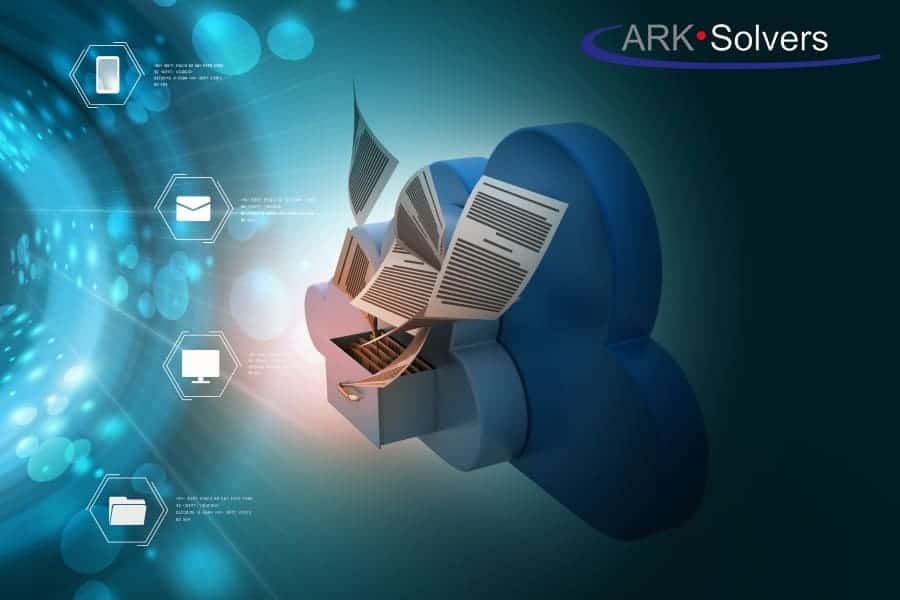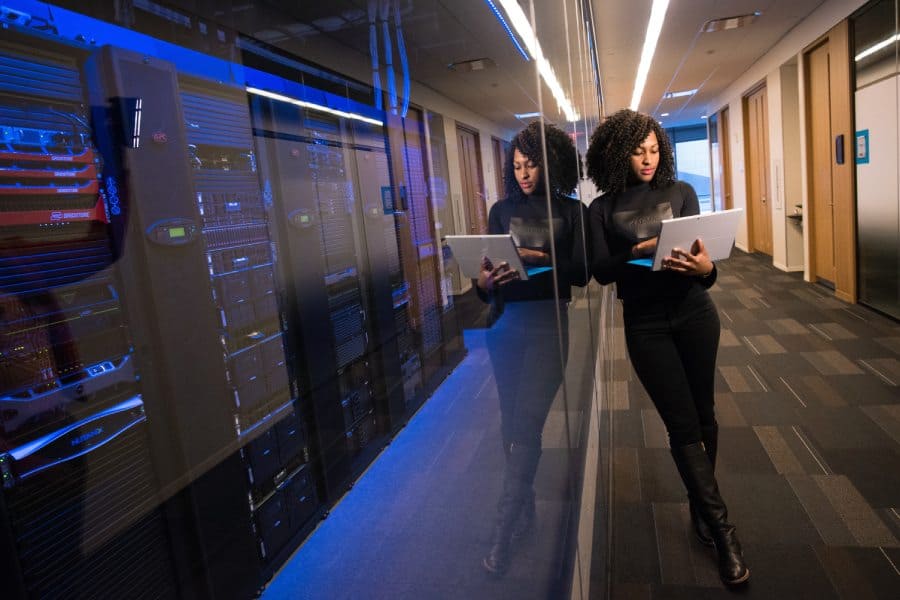Laptop vs Desktop: Choosing the Best for Your SMB
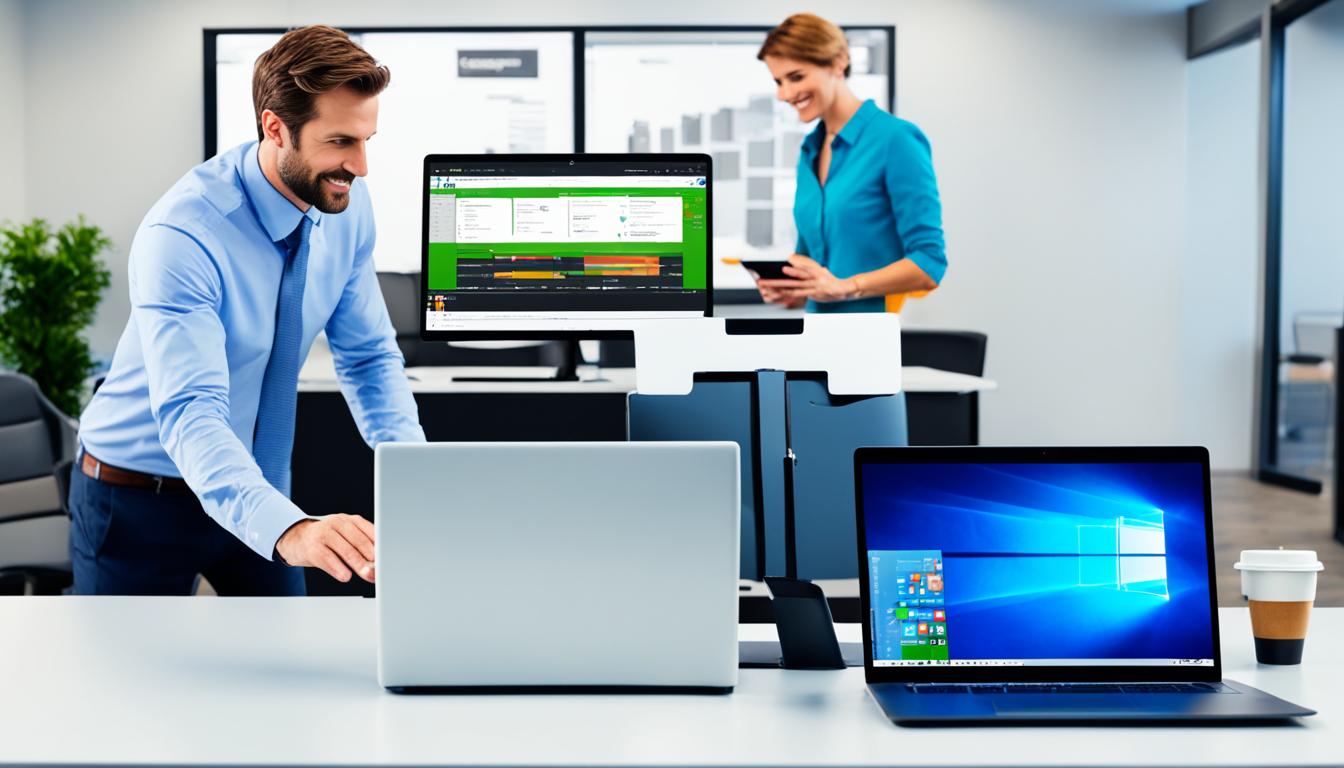
Laptop vs Desktop: Choosing the Best for Your SMB 2024
Are you wondering if a laptop or desktop is best for your small or midsize business? This choice can impact operations, productivity, and costs. Understanding the advantages and disadvantages of laptops vs. desktops is key.
SMBs must carefully choose their computing solution. Do you need laptops to be portable, or do you need the computing power of desktop computers? We’ll dive into details to help you see how each option can boost your efficiency.
We will examine various aspects of laptops and desktops, including performance benchmarks, costs, and workspace considerations. By the end, you will have a clear idea of the best choice for your SMB.
Key Takeaways
- Understand the primary differences in performance between laptops and desktops.
- Evaluate the impact of portability on your business operations.
- Identify how computing power affects day-to-day tasks.
- Consider cost-effectiveness in the context of your firm’s budget.
- Recognize how your workspace considerations can influence the decision.
Understanding Performance and Computing Power
When choosing your small business, you should know the details about computer power. Our aim here is to look at the main parts that affect a computer’s speed. We’ll also check their ability to get better over time, which can guide your choice.
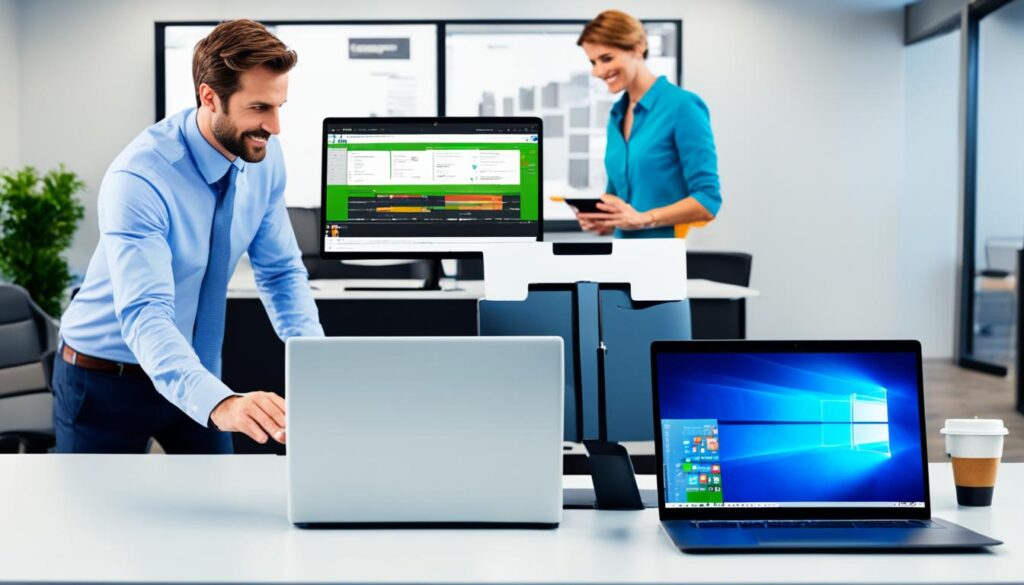
Hardware Specifications
The core of any computer is its hardware. This plays a big part in how well the computer works. Desktop computers usually have a wider choice of processors from brands like Intel and AMD. They also have more RAM, which means they can run many big programs at the same time. Desktops may also come with powerful graphics cards for things like video editing and 3D work. And, in terms of storage, you often get more choices with desktops like SSDs and HDDs.
On the other hand, laptops have to fit everything into a smaller space. This means some parts, like the graphics card, might need to be more powerful. However, laptops can still perform very well for most tasks.
Performance Benchmarks
Benchmarks like Cinebench, Geekbench, and 3DMark let us see how different computers compare. In tests of multi-core performance, desktops usually do better, which tells us they might work faster with hard tasks. Also, desktops tend to have stronger graphics cards than laptops. And they often have quicker storage, showing their edge in speed.
This kind of testing is key for small businesses. It lets them choose computers based on data, not just brand names.
One big plus for desktops is how you can upgrade them. You can swap out parts like the CPU and RAM for better ones. This boosts a computer’s life and speed. Laptops, on the other hand, are harder to upgrade. You’re mostly looking at changes in RAM and storage, which isn’t different from getting a whole new part.
| Component | Desktop | Laptop |
|---|---|---|
| Processor | High-end options (Intel i9, AMD Ryzen 9) | Mid-range options (Intel i7, AMD Ryzen 7) |
| RAM | Expandable up to 128GB or more | Limited to 32GB typically |
| Graphics Card | Discrete, powerful GPUs | Integrated or mid-range discrete GPUs |
| Storage | Multiple SSD/HDD configurations | Limited to one or two drives |
| Upgrade Potential | High (most components upgradable) | Limited (typically RAM and storage) |
Mobility vs Power
Choosing between a laptop and a desktop means understanding the pros and cons of mobility and power. We will explore the benefits and limits of each choice.
Portability and Mobile Workstations
Many professionals choose mobile workstations because of their great portability. These gadgets let you work from anywhere, which is perfect for those who must move around a lot. Today, mobile workstations can offer amazing performance in a small size, which is really useful in work areas such as architecture, graphic design, and video editing.
Stationary PCs and Desktop Performance
On the flip side, desktop PCs are the go-to for tasks needing high desktop performance. They have stronger processing power and can take more upgrades. They are better for work that needs a lot of constant power. Fields like data science, software development, and virtual reality use desktop PCs for their top-notch performance.
Cost-Effectiveness and Price Comparison
When choosing a laptop or desktop for your business, consider the overall cost. Each has different costs, from buying to upkeep. Compare the laptop vs. desktop price over time, not just up front.
In the beginning, a laptop might seem more expensive than a desktop with the same features. However, desktops can stay useful longer thanks to desktop upgrades. This can save money in the long run. Laptops, however, can only be upgraded a little. This might mean you have to buy a new one sooner.
Looking at power use is also key to saving money. Desktops use more electricity than laptops. This can add up to your energy bill. Laptops, though, are designed to use less power. So, thinking about how much they cost to run is important in a price comparison.
For a clearer picture, here’s a full look at how laptops and desktops stack up:
| Criteria | Laptops | Desktops |
|---|---|---|
| Initial Investment | Higher | Lower |
| Upgrade Potential | Limited | High |
| Power Efficiency | High | Moderate |
| Maintenance Costs | Lower | Variable |
| Total Cost of Ownership | Medium | Varies with Upgrades |
Consider these points for small and medium-sized businesses. Fully assessing all these costs helps you pick the best option based on your business’s needs.
Form Factor and Workspace Considerations
Choosing between a laptop and a desktop involves understanding how form factor affects your workspace. The design of these devices greatly influences how comfortable and productive you are. It’s key to match your choice with what your workspace needs for comfort and efficiency.
Ergonomics and Workspace Ergonomics
Creating a workspace that’s both efficient and comfortable relies on good ergonomics. Ergonomics help avoid strain and keep you working well for a long time. With their small size, laptops offer the benefit of being portable. But they might only be the best for your body with extra gear like stands and keyboards. On the other hand, desktops, which often have bigger screens and keyboards, can provide a more ergonomic setup naturally. Thinking about ergonomics boosts your workspace’s efficiency and makes you feel better.
All-In-One Desktops
All-in-one desktops combine the computer and monitor into one, simplifying your workspace. This setup reduces clutter and the number of cables you have to deal with. All-in-ones also pack power, which is great for users who want both performance and looks. Their compact design means you can arrange your workspace more easily, making them a perfect choice for those seeking better workspace ergonomics.
Thinking about these points can guide your choice of tech for your workspace. They ensure your pick not only fits your space but also boosts your comfort and productivity.
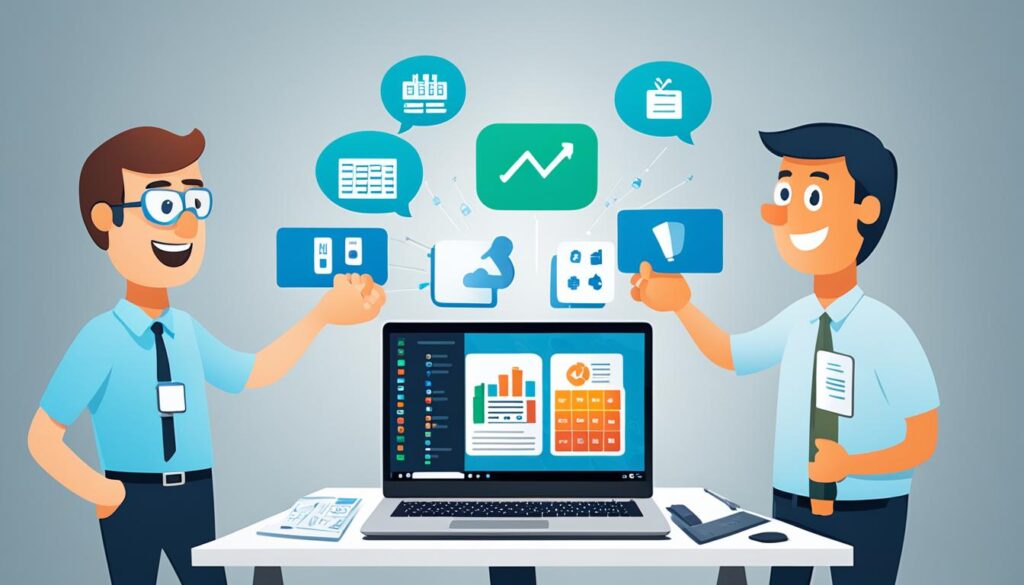
Laptop vs Desktop: Which is Better for Gaming?
When comparing laptop vs. desktop gaming, it’s key to compare their gaming features. Gaming laptops and desktops have both improved, but they still have big differences. Certain industries, like game development, prefer one over the other. Let’s dive into why.
Gaming laptops are now very powerful. They come with top-notch GPUs and CPUs in a slim, portable package. But, due to their small size, they can’t match the gaming power of desktops. Desktops win with better graphics, cooling, and easy component upgrades. For top gaming performance, desktops are the way to go.
Choosing a desktop replacement for your business means considering both sides. Desktops are often better value for the price in terms of gaming power. Yet gaming laptops offer the freedom of moving, making them good for businesses where employees need to travel or have special work setups.
Both laptops and desktops offer strong gaming features. But the choice depends o n your business needs. A gaming laptop is more suitable for on-the-go work, while a desktop is better for longer-term, powerful performance. Balancing these factors helps you pick the right gaming tool for your needs.
Conclusion
After considering aspects like power, price, portability, and size, small and medium-sized businesses (SMBs) can make better choices. They can more wisely decide between a laptop and a desktop.
Laptops are easy to take with you, which is good for work outside the office. But they can’t hold as much stuff and aren’t easy to upgrade. Desktops are great for having the best technology and lots of space. They are for work that stays in one place, giving more power and being better in the long run.
Being able to use your device for a long time without recharging is key for people who move around a lot. Laptops are perfect for anyone who studies or works in many places. However, if you care more about top-notch technology and being able to add more stuff to your computer, desktops are the way to go.
To wrap things up, there’s no single best pick when comparing laptops and desktops. It’s crucial to think about your business’s specific needs. By looking at how much they can store, how long they last on a battery, and if you can make them better, users can pick what suits them best. This choice will support their current work and plans for growing in the future.
FAQ
What are the key advantages and disadvantages of laptops vs desktops for SMBs?
Laptops are great for work outside the office. They’re light and easy to transport. Desktops, on the other hand, are very powerful and can handle big tasks. When choosing between them, think about where you’ll use it most.
What hardware specifications should I look for when comparing laptops and desktops?
A fast processor, lots of memory, a good graphics card, and plenty of storage are key. Desktops can hold more powerful parts than laptops.
How do laptop performance benchmarks compare to desktops?
Tests often show that desktops are faster, thanks to better cooling methods. But many laptops now work well for everyday office jobs.
How does portability impact my choice between a laptop and a desktop?
If you move around a lot for work, a laptop is very useful. It lets you do serious work anywhere. There are also powerful laptops that are light enough to carry.
Why might a stationary PC be a better option for some companies?
Desktops shine in jobs that need a lot of power, like designing or analyzing data. They can often be made more powerful and last longer than laptops. Plus, they’re easier and cheaper to upgrade.
Are laptops or desktops more cost-effective for SMBs?
At first, desktops may need more because they don’t include everything to start. But, over time, their lasting power and upgrade options can save money. Laptops, however, need more replacing over the years.
How do form factors and workspace ergonomics influence the decision?
Desktops can be set up to be better for your body. They have big screens and comfy keyboards. Laptops are neat and save room, but can be less comfy for your neck and arms.
Which is better for gaming, a laptop or a desktop?
For gaming, desktops usually win because they can be very powerful and cool. Yet gaming laptops are catching up. They’re good for gaming on the move, but they can cost more.


